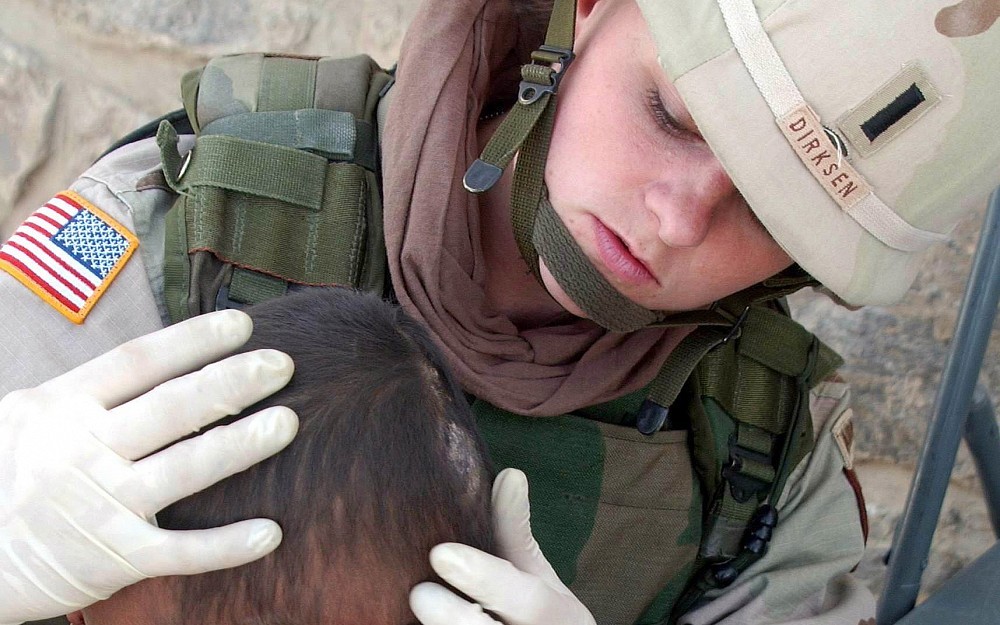
Public Gets Rare Chance to Visit an Army Combat Surgery Team
CINCINNATIThe 933rd Forward Surgical Team (FST) stationed in Paducah, Ky., is visiting the University of Cincinnati (UC) campus May 10 from 8 a.m. to 5 p.m. in honor of National Nurses Week (May 612).
The FST is a 20-person team, including surgeons, anesthetists and nurses who provide immediate medical care for soldiers on the battlefield, assessing and treating their injuries before they are transported to field hospitals for long-term care.
Being forward on a battlefield means being close to where the combat troops are, says Eric Bentley, MD, lieutenant colonel and commander of the 933rd FST. He is also trauma director for Taylor Regional Hospital in Campbellsville, Ky. Were right at the very front of the battlefield, which allows us to provide advanced surgical care to critically wounded soldiers. Often a hospital is at least an hour away, and soldiers may die before they get there. We work to stop their bleeding and increase their chance of survival before transporting them a hospital.
The 933rd FST recently returned from Iraq and is inviting the public to tour their unit to share their experiences and photographs. The unit will be located on the green space in front of University Hall (corner of
Goodman Avenue and Vine Street).
Its rare for the public to have a chance to visit an FST unit, says Dr. Bentley. We want to give people an opportunity to experience firsthand how their tax dollars are helping save the lives of soldiers.
We also hope health-care professionals in the area will visit the unit, see how their skills are needed and consider military medicine as a career option, Dr. Bentley says. Dr. Bentley himself joined the Army reserves several years ago in his mid-40s because he knew his skills as a general surgeon would benefit the country, and he felt the need to help.
Andrea Lindell, DNSc, dean of the UC College of Nursing, says, Nurses are a vital part of any health-care team and must be adaptable to diverse situations. Were honored the Army is sharing their expertise and experiences saving lives with the people in our community.
There are 24 FST units in the Army reserves and 12 on active duty. Units are generally tents equipped with operating tables and lights, IVs, surgical instruments and two portable refrigerators for blood (they have 30 units on hand). They are equipped to provide care to critically wounded soldiers for 72 hours before another unit moves forward to allow units to restock their supplies.
FST units are set up in three areas, a receiving (triage) area where wounded soldiers injuries are assessed, an operative area and a postoperative (recovery) area. The units have to keep up with the movement of the forces and are designed to be able pack up and move in two hours.
FST units are a fairly new concept. Most people dont realize that were right there to take care of injured soldiers, says Dr. Bentley. Its pretty intensive, but were able to provide high-quality care to wounded soldiers faster and more effectively, increasing their chance of survival.
Tags
Related Stories
Kentucky mom shares her colon cancer journey to save others
March 26, 2025
University of Cincinnati Cancer Center patient Patty Goering and physician researcher Tahir Latif spoke with WLWT about Goering's story of being diagnosed and treated for colon cancer at a young age.
President Pinto shares search update for executive vice...
March 25, 2025
President Neville Pinto shares search update for executive vice president for academic affairs and provost
University of Cincinnati College of Medicine celebrates...
March 25, 2025
The energy inside the University of Cincinnati College of Medicine’s Kresge Auditorium was electric on Friday, March 21, 2025, as 169 fourth-year medical students eagerly gathered with family, friends, faculty and staff for the highly anticipated Match Day 2025 ceremony. The event marked the culmination of years of dedication, hard work and perseverance, with students learning where they will continue their medical training through residency programs.
